
On September 9, 1988, the regions of Auvergne-Rhône-Alpes (France), Baden-Wurttemberg (Germany), Catalonia (Spain) and Lombardy (Italy) signed a cooperation agreement constituting the network of the “Four Motors for Europe”. The goals of collaboration in 1988 were primarily related to economics and research as well as to art and culture. In the course of the following decades the scope and intensity of cooperation grew notably.
All four regions are strong in terms of economic as well as research performance. Together the Four Motors for Europe encompass 36 million inhabitants and account for approximately 9 % of European economic output. By collaborating the four regions seek to further develop their top position as dynamic regions in Europe. The four regions wish to learn from each other and thereby to find innovative solutions for key topics of the future. The fields of today’s cooperation encompass in particular economic development, research and innovation, training and higher Education, climate and environment, transport and mobility, health, agriculture, civil society and the arts.
In this respect, the Four Motors for Europe support collaborative projects among regional stakeholders. In this vein, the Four Motors for Europe have been fueled by various innovative projects and many economic, scientific and university as well as civil society exchanges. To give some examples: Today more than a thousand young apprentices complete an internship each year in a partner region. More than one hundred interuniversity agreements are actively and financially supported by the regions.
The Four Motors for Europe have been one of the first European networks of regions. The foundation of the network coincided with major processes of the European integration. In the course of these developments the European Union has been created by the treaty of Maastricht in 1992, which strengthened the role of regions in the EU and created the Single Market. The Four Motors for Europe have since those days supported a strong position of regions in Europe and have served as an example of a stronger international affiliation of European regions. The group actively contributes to European affairs especially by issuing common positions on EU policy initiatives.
Flexibility is one of the defining features of the network, which does not have institutions of its own. The presidency changes every year according to a fixed turn and gives the network a vibrancy that is reflected in its contents. The network is steered by a Coordination Committee, consisting of general coordinators in the presidents executive offices. The thematic work is done by several working groups.
For more information, see our flyer.